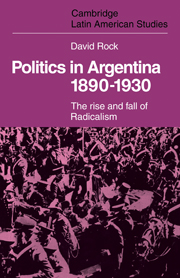Book contents
- Frontmatter
- Contents
- Preface
- 1 The components of Argentine society, 1890–1914
- 2 The oligarchy and institutional reform, 1880–1916
- 3 The rise of Radicalism, 1891–1916
- 4 The workers and their politics in Buenos Aires, 1890–1916
- 5 The first Radical government, 1916–22
- 6 The strikes, 1916–18
- 7 The Semana Trágica
- 8 1919
- 9 Postscript to the first presidency, 1920–2
- 10 The Alvear interlude, 1922–8
- 11 Yrigoyen's second presidency, 1928–30
- 12 Perspectives
- APPENDIXES
- 1 The occupational and class structure of the male population of the city of Buenos Aires by nationality, 1914
- 2 The rise of Radicalism – an historiographical note
- 3 The first Radical government and the Argentine Rural Society
- 4 The working class vote for the Radical and yrigoyenista parties in selected areas of Buenos Aires, 1912–30
- Select bibliography
- Index
10 - The Alvear interlude, 1922–8
Published online by Cambridge University Press: 04 August 2010
- Frontmatter
- Contents
- Preface
- 1 The components of Argentine society, 1890–1914
- 2 The oligarchy and institutional reform, 1880–1916
- 3 The rise of Radicalism, 1891–1916
- 4 The workers and their politics in Buenos Aires, 1890–1916
- 5 The first Radical government, 1916–22
- 6 The strikes, 1916–18
- 7 The Semana Trágica
- 8 1919
- 9 Postscript to the first presidency, 1920–2
- 10 The Alvear interlude, 1922–8
- 11 Yrigoyen's second presidency, 1928–30
- 12 Perspectives
- APPENDIXES
- 1 The occupational and class structure of the male population of the city of Buenos Aires by nationality, 1914
- 2 The rise of Radicalism – an historiographical note
- 3 The first Radical government and the Argentine Rural Society
- 4 The working class vote for the Radical and yrigoyenista parties in selected areas of Buenos Aires, 1912–30
- Select bibliography
- Index
Summary
The war and post-war period of rapid inflation, which was the most important conditioning factor on politics during Yrigoyen's presidency, ended with the post-war depression in 1921. The economic background to the next six-year presidential term was depression followed by a prolonged phase of recovery which lasted until 1929. Although there was a recession in 1925, foreign trade and exports averaged out over the period as a whole above the levels they had attained immediately before the war. During the 1920s agricultural production did not expand as rapidly as during the pre-war period. There was little land left to bring into production, and there was no major investment programme to increase productivity by any great amount. In part such investment was discouraged by signs of changing patterns of world demand for agricultural products. Before 1914 the great boom had occurred mainly with cereals. In the affluent 1920s a shift developed towards meat. This meant the gradual replacement of cereal production by cattle farming, and a correspondingly greater prevalence of extensive farming. Although it went largely unperceived at the time, the 1920s was a period of incipient stagnation in the export economy. This began to encourage efforts at economic diversification.
As before 1914, Argentina's imports were generally higher than her exports, and the deficit was covered by new injections of foreign capital. Of this, however, a growing proportion began to come from the United States.
- Type
- Chapter
- Information
- Politics in Argentina, 1890–1930The Rise and Fall of Radicalism, pp. 218 - 240Publisher: Cambridge University PressPrint publication year: 1975



